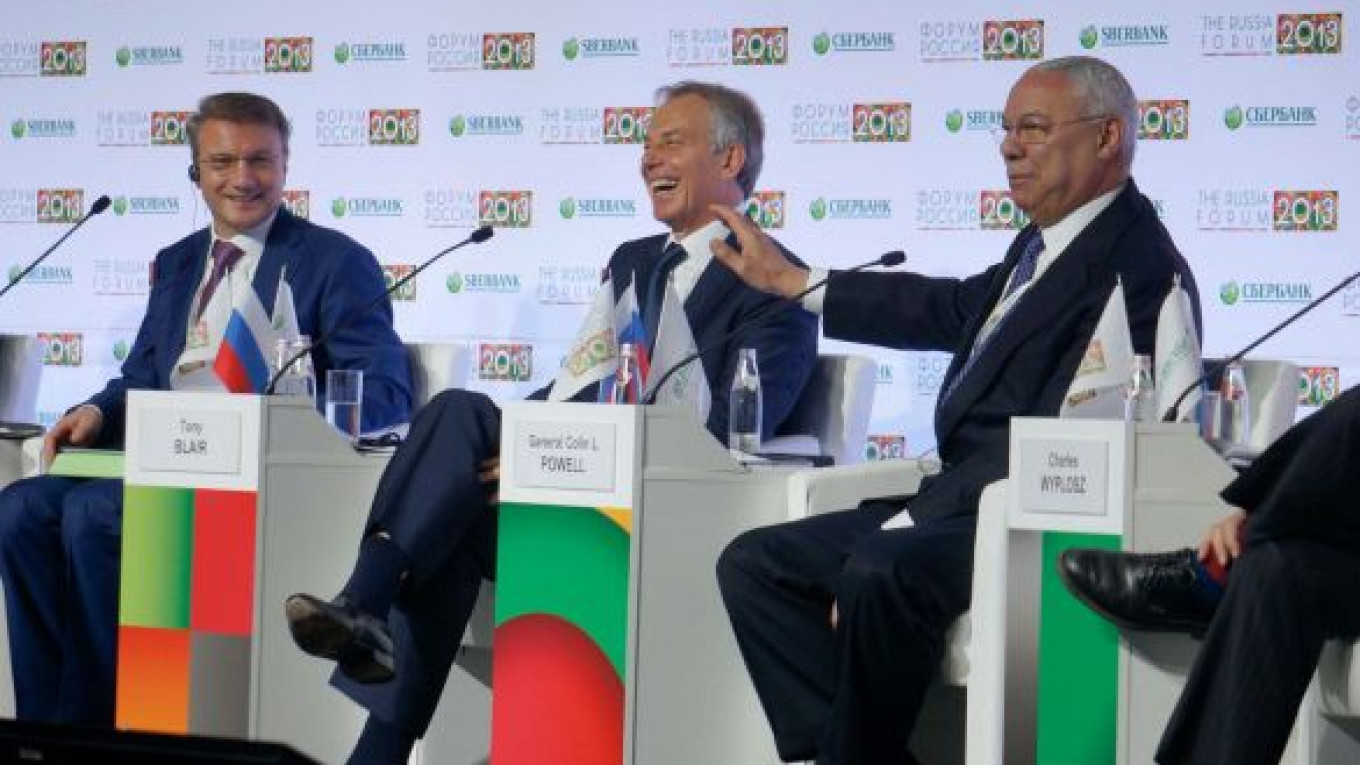Personal memories mixed with hot discussions about the prospects of the global economy Thursday as high-profile visitors like former British Prime Minister Tony Blair and U.S. statesman Colin Powell gathered at an investment conference in Moscow to offer Russia new ways of economic development.
Participants in the annual Russia Forum organized by Sberbank discussed the possible paths Russia should follow to ensure economic stability amid market volatility worldwide and shaky oil prices.
Inefficient public governance was picked as the biggest challenge facing Russia now during an online vote at the first key panel session.
"Based on our history, people forced to choose between freedom and order will choose order. Everyone is afraid of revolution," said German Gref, chief executive of Sberbank and host of the forum.
Other challenges discussed at the panel included underdeveloped institutions and political system, weak economic diversification, poor infrastructure and improving the quality of education.
Growth and investor rights are hot topics at the annual Sberbank investment event.
The latter measure found staunch support from Powell, who said the education system should catch up with that of developed countries in order to be an effective driver of development.
In a deja vu moment, Powell — who served as United States Secretary of State between 2011 and 2005 — added color to the discussion when he recalled that one of the biggest economic issues he had to deal with was resolving a ban on U.S. imports imposed by Russian authorities.
A Vietnam-war veteran who was appointed Chairman of the Joint Chiefs of Staff in the late 1980s, Powell drew applause from the hall full of investors and officials when he described his feelings about cooperation with Russia.
"I used to command armies and now I'm selling chicken. Wonderful!" he said causing the session attendees to laugh aloud. Powell then continued: "I'd rather sell chicken, than fight against the Russian army."
Turning to more serious issues, he agreed with other panelists that Russia should reduce its dependence on natural resources to attain stable economic growth.
Stability was a recurring theme for forum participants as Russia faces an economic slowdown and government officials speculate on the chances for the country to go into a recession later this year.
Meanwhile, Gref was optimistic about the prospects of the country's economy.
"I don't expect a recession … I don't think it's a reality. The reality is slow rates of economic growth," he told journalists on the sidelines of the forum. "I believe that there's space for maneuvering in any difficult situation."
First Deputy Prime Minister Igor Shuvalov, who spoke at the forum later, also pushed for maintaining a sober view of the situation and not giving way to "nervous sentiment."
Economic Development Minister Andrei Belousov warned last week that the country's economy might enter a recession if no measures were taken to stimulate growth.
Gref called for government officials to speed up enforcing policies to improve the investment climate and attract capital to stimulate economic growth.
Russia should use the situation in Cyprus, which is facing a large-scale shake-up of the banking sector, to repatriate Russian investors' funds deposited on Cypriot accounts, he said. "It's a big challenge for Russia and a big opportunity," he added.
For this to happen, the government should intensify efforts to create an international financial center in Moscow, Gref said.
But some forum participants expressed doubts that foreign investors would be interested in a country whose own citizens prefer other destinations.
One possible issue that might be scaring investors off is poor corporate governance, since minority shareholders in big companies do not receive proper treatment, said Mark Mobius, executive chairman of Templeton Emerging Markets Group, a private equity fund that has been investing in Russia since 1993.
Mobius, whose firm has $1.2 billion invested in Russian equities, including TNK-BP, referred to the recent purchase of the oil company by state-run behemoth Rosneft. Speaking on the sidelines of the forum he called for Rosneft management to treat minority shareholders fairly.
"TNK-BP is a big issue now. We feel that the assets of TNK-BP are much greater than the price reflects and we hope that … minority investors get a fair treatment," he said.
The issue hit the spotlight after Rosneft chief executive Igor Sechin made it clear last month that the oil giant had no intention to ensure the interests of TNK-BP's minority owners.
Rosneft "hasn't taken on any obligations to minority owners," he said after closing the megadeal worth more than $40 billion.
The oil giant will seek to resolve the issue, Shuvalov said at the forum without elaborating.
Sechin met with TNK-BP minority shareholders Wednesday to discuss the situation, but few details of the gathering were made public.
Mobius said one possible way to ensure the rights of minority shareholders was to pay them a "nice fat dividend." He added that the way TNK-BP minority shareholders were being treated was a "litmus test" for the business climate in Russia.
Contact the author at irina.filatova@imedia.ru
A Message from The Moscow Times:
Dear readers,
We are facing unprecedented challenges. Russia's Prosecutor General's Office has designated The Moscow Times as an "undesirable" organization, criminalizing our work and putting our staff at risk of prosecution. This follows our earlier unjust labeling as a "foreign agent."
These actions are direct attempts to silence independent journalism in Russia. The authorities claim our work "discredits the decisions of the Russian leadership." We see things differently: we strive to provide accurate, unbiased reporting on Russia.
We, the journalists of The Moscow Times, refuse to be silenced. But to continue our work, we need your help.
Your support, no matter how small, makes a world of difference. If you can, please support us monthly starting from just $2. It's quick to set up, and every contribution makes a significant impact.
By supporting The Moscow Times, you're defending open, independent journalism in the face of repression. Thank you for standing with us.
Remind me later.






